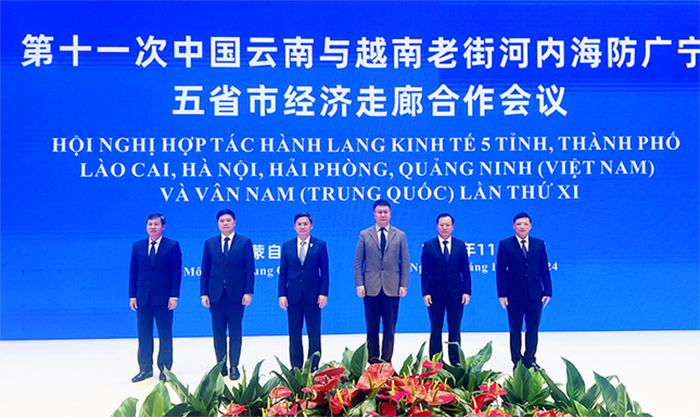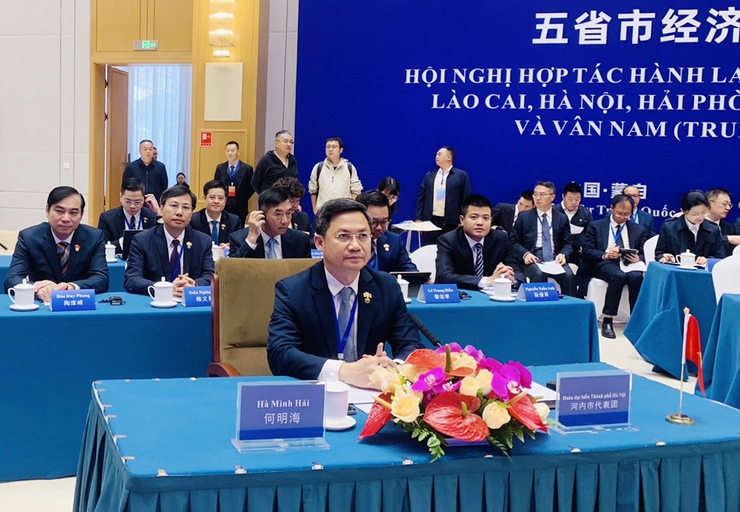A delegation from Hanoi, led by Vice Chairman of the Hanoi People's Committee Ha Minh Hai visited Yunnan Province from November 24 to November 26, 2024, to commemorate the 20th anniversary of economic cooperation among five provinces and cities—Lao Cai, Hanoi, Haiphong, Quang Ninh (Vietnam), and Yunnan (China).
Speaking at the 11th Conference on Economic Corridor Cooperation, Hai emphasized the city's commitment to enhancing its cooperative ties with China, particularly through the five-province/city Vietnam-China economic corridor mechanism.
He highlighted Hanoi's strategic focus on fostering partnerships with Chinese counterparts as a priority within its broader framework of international collaboration.

Delegates at the event.
In 2024, Vietnam's National Assembly passed the amended Capital Law, which introduces unique mechanisms aimed at bolstering Hanoi's development. Concurrently, the city completed its Capital Master Plan for 2021-2030 with a vision to 2050, alongside adjustments to its General Plan through 2045 with a perspective to 2065. The plans envision a dynamic, open, and smart city, with spatial organization closely aligned with national corridors and connections to international economic corridors and border economic zones.
The Northern Corridor of Hanoi, established on the foundation of the Lao Cai-Hanoi-Haiphong-Quang Ninh economic axis, has been designated as the principal connecting route for the northern economic zone. It links Hanoi to the northern midland and mountainous provinces, as well as major economic centers and seaports in Quang Ninh and Haiphong.
The corridor also facilitates trade and investment cooperation with southwestern China, positioning itself as a hub for logistics, high-tech industries, and cultural and historical tourism connecting Hanoi to destinations like Phu Tho, the land of Hung Kings, and the northern midlands.
Vice Chairman Hai affirmed that these legal and strategic frameworks would provide Hanoi with unprecedented opportunities to leverage its advantages, promoting rapid and sustainable development.
He expressed optimism about leveraging new resources to enhance collaboration with international partners, particularly those along the Vietnam-China economic corridor. Such partnerships, he noted, are expected to go beyond fostering mutual understanding and friendship, delivering tangible benefits to citizens and businesses while contributing to the comprehensive development of all involved localities.

Vice Chairman of the Hanoi People's Committee Ha Minh Hai at the meeting.
The conference provided a platform for delegations from the participating provinces and cities—Lao Cai, Hanoi, Haiphong, Quang Ninh (Vietnam), and Yunnan (China)—to review cooperative achievements, address challenges, and propose solutions to enhance collaboration. Three thematic discussions were held on economic and trade cooperation, interconnectivity, and cultural exchange.
These discussions drew broad participation from government agencies, investment promotion bodies, and businesses, aiming to innovate collaborative approaches, facilitate effective communication channels, and create opportunities for investment and trade, thereby capitalizing on each locality's strengths.
The conference concluded with the signing of an agreement, reaffirming commitments to enhance cooperation in various areas, including investment, trade, transportation, logistics, culture, tourism, and healthcare. The parties agreed to hold the 12th Cooperation Conference in Lao Cai in 2026.
As part of its visit, the Hanoi delegation participated in the launch of the "Red River Festival—Vietnam-China Red River Basin Cooperation Week" and the opening of the 2024 Vietnam-China Border Economic, Trade, and Tourism Fair.
Organized by Yunnan Province and Honghe Prefecture, the festival featured a series of trade fairs, investment forums, and promotional events. Besides delegations attending the 11th Cooperation Conference, the festival welcomed representatives from other Vietnamese localities along the Red River basin and those with cooperative ties to Yunnan Province.